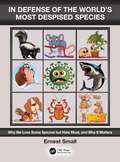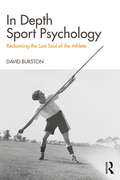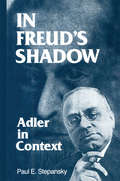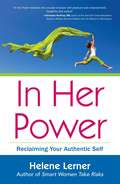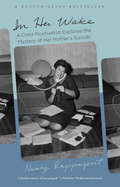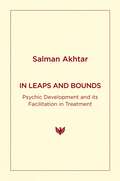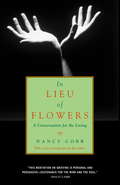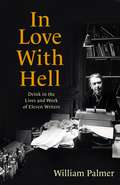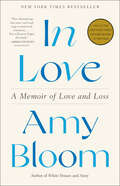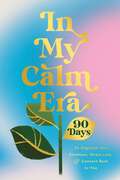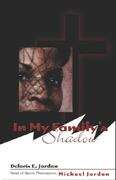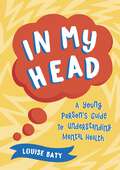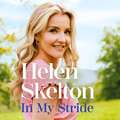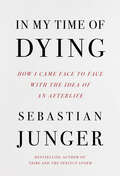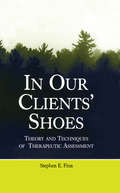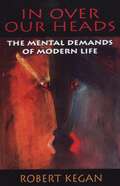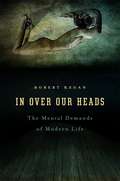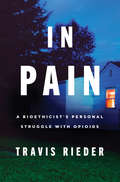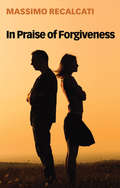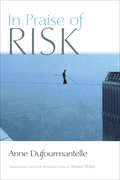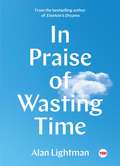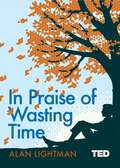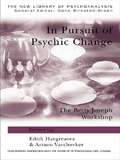- Table View
- List View
In Defense of the World’s Most Despised Species: Why we love some species but hate most, and why it matters
by Ernest SmallSome animals and plants injure or kill millions of people annually, others cause trillions of dollars in property damage and loss. Such harmful species are understandably hated. However, the vast majority of the planet’s millions of species are disliked simply because of how they look and act. This bias is endangering numerous species that play important roles in maintaining both the natural ecosystems and the human economies of the world. In Defense of the World’s Most Despised Species examines the psychological motivations that lead people to make judgments about the attractiveness of species, noting the overwhelming importance of visual cues. It describes in considerable detail the physical and behavioral traits of species that lead us to love or hate them. Full color illustrations throughout present beautiful, charming animals and plants, species that seem loathsome, behavior of people in relation to such divergent species and their characteristics, and numerous explanatory diagrams of relevant biological and psychological phenomena. The aim of this book is to give readers insights into how we humans arrive at biased judgments and to promote the welfare of valuable, albeit sometimes unlovable animals and plants that consequently suffer from discrimination. Many of the ugliest, most disgusting, and feared species, such as vultures, toads, hyenas, sharks, spiders, and even the vast majority of cockroaches, in reality are some of our most valuable friends. Features Theme of the book – human preferences for and against species – is novel, scarcely examined to date. Multidisciplinary analysis, especially psychology, biological conservation science, and ecology, as well as philosophy, agriculture, urban planning, human health, and law. Text is accessible, user-friendly, concise, and well-organized, making numerous complex topics comprehensible, readable not only by specialists, but also by students and the educated layperson. Includes over 2,000 high-quality, entertaining, and informative color figures.
In Depth Sport Psychology: Reclaiming the Lost Soul of the Athlete
by David BurstonIn Depth Sport Psychology: Reclaiming the Lost Soul of the Athlete is a unique exploration of the vital archetypal elements and themes that emerge when considering elite sportssport psychology through a depth psychological lens. It provides athletes, young people, coaches and clinicians with ways to harness the self, placing athletes on a path towards personal growth and sporting excellence by reconnecting their spirit to their sport. Burston’s multidisciplinary and inclusive approach details the importance of spirituality and other unmeasurable factors, such as emotional recovery, when investigating sporting potential. Incorporating research from classic mythology and the Greek sports academies, he traces sport back to humanity’s animalistic and traumatic origins, explores the rise of the Olympic movement, and compares archetypal identities that are shared with athletes today. Relating this to today’s financially driven and technological sporting climate, he considers the roots of play, examines the difference in the psyche of team sports and individual players, discusses the crucial, clinical welfare of young people, and dedicates a section to sportswomen. In Depth Sport Psychology emphasises how awakening an athlete’s unconscious spirit can positively improve their performance, and offers an applicable methodology for athletes and teachers to use to better understand themselves and achieve brilliance. Uniquely exploring the connection between Jungian depth psychology and sports, the accessible tone of In Depth Sport Psychology will be key reading for analytical and depth psychologists in practice and in training, sports psychologists and other professionals working with athletes. It will also appeal to athletes and sportspeople interested in exploring a new perspective on sporting excellence.
In Freud's Shadow: Adler in Context
by Paul E. StepanskyIn its detailed, interpretive reconsideration of Adler's involvement with Freud and psychoanalysis, In Freud's Shadow constitutes a seminal contribution to our historical understanding of the early psychoanalytic movement. Making extensive use of the Minutes of the Vienna Psycho-Analytic Society, Freud's correspondence, and the diaries of Lou Andreas-Salome, Stepansky reconstructs the ambience and reanalyzes the substance of the ongoing debates about Adler's work within the psychoanalytic discussion group. One valuable by-product of his undertaking, then, is a compelling portrait of the early Vienna Psycho-Analytic Society from the standpoint of the sociology of small groups and, more especially, of Freud's status as the "group leader" of the Society. Thoroughly researched, meticulously documented, and brilliantly written, In Freud's Shadow: Adler in Context represents a watershed in the literature on Adler, Frued, and the history of psychoanalysis. It will be of major interest not only to psychoanalysts, psychiatrists, and psychologists, but to social scientists, historians, and lay readers interested in the politics of scientific controversy, the sociology of small groups, and the relationship of psychology to contemporary systems of belief.
In Her Power
by Helene LernerUnveil your inner power to achieve confidence, creativity, and intimacy in every aspect of your life--from work to relationships to sex.Helene Lerner--a leading advocate for women's advancement and empowerment--reveals the nine most common self-sabotaging behaviors that hold women back and uncovers simple secrets to unlocking true feminine power. Her approach is gentle but firm, compassionate yet disciplined, and eminently practical. Discover your unique strength through insightful exercises and uplifting stories that cultivate self-empowerment. Learn how to:* stay present in the face of any challenge;* express yourself genuinely in all aspects of your life;* recognize and appreciate your uniqueness;* be authentically seen and heard with confidence;* express your sexuality and experience true pleasure. As the traditional male power structures crumble, be part of the new feminine movement that is emerging across the globe and embrace your power.
In Her Wake: A Child Psychiatrist Explores the Mystery of Her Mother's Suicide
by Nancy RappaportIn 1963, Nancy Rappaport’s mother committed suicide after a bitter divorce and custody battle. Nancy was four years old. As one of eleven children in a prominent Boston family, Nancy struggled to come to terms with the reasons why her mother took her own life. After years spent interviewing family and friends, Rappaport uncovers the story of a conflicted and troubled activist, socialite, and community leader. Drawing on court depositions, her mother’s unpublished novel, newspapers, and her own experiences, she highlights heartbreaking stories of a complicated life that played out in the public eye. Inspiring, honest, and engaging, Rappaport’s story sheds light on the agonizing nature of loss and healing, and reveals the permeable boundaries between therapists and the patients they treat.
In Leaps and Bounds: Psychic Development and its Facilitation in Treatment
by Salman AkhtarSalman Akhtar presents three rich essays brimming with psychoanalytic theory on personality development and how such knowledge enhances treatment. Essay 1 starts at the earliest infancy and takes the reader all along the path past adolescence. It addresses key developmental landmarks, including: Establishing a satisfactory parental bond Moving towards autonomy and independence Acquiring a moral sense Consolidating identity. Essay 2 picks up after adolescence. It addresses the psychosocial challenges characteristic of young adulthood, midlife, and old age, such as: Assuming the role of a wage-earner and "house-holder" Enjoying sex, love, and marriage Downsizing and retiring from one's job Dealing with the deaths of friends and family and facing one's own mortality. Essay 3 builds upon the theory that has gone before and examines how a deepened understanding of psychic development can inform the clinician's approach. With an emphasis on development as a lifelong process, this essay provides clear guidelines for facilitating such growth, including: Creating psychic space for thinking Helping the patient find words for inner experiences Validating the patient's reality Enhancing the sense of personal agency in the patient. The complex tapestry woven by these three essays is extended by a prologue and an epilogue. The prologue opens with the "pre-self" - events before birth that impact on who we become. The epilogue discusses the "post-self" - how we "live on" as memories held by those who knew us. In Leaps and Bounds deepens the understanding of the nuances of human development. It is key reading for practising and trainee psychoanalysts and psychoanalytic psychotherapists to enhance their clinical practice. It is highly recommended for all enquiring minds looking to expand their knowledge of what makes us who we are.
In Lieu of Flowers: A Conversation for the Living
by Nancy Howard CobbA thought-provoking exploration of life's most profound transition • With candor and refreshing perspective, Nancy Cobb infuses the oft-avoided subject of death with light, presenting it as a natural process to be honored rather than feared. "This meditation on grieving is personal and persuasive — sustenance for the mind and the soul." —Wally Lamb, #1 New York Times bestselling author &“An elegant book ... that lets readers know they aren&’t alone.&”—The Wall Street Journal&“Grieving is as natural as breathing, for if we have lived and loved, surely we will grieve. . . .&” Nancy Cobb meets death in the most vital of places—in the lives of everyday people—and in doing so has found a way to make the darkest of subjects more approachable, and the deaths of those she has loved—and death itself—a subject to explore rather than to avoid. Cobb's personal experiences become a point of departure for what amounts to a deeper conversation about loss. She shares moments of her own mourning and draws others into the conversation as well: among them, a bank teller who still dreams of her deceased grandmother, two small children who bury a wild bird in its final nest beneath a maple tree, and a hospice nurse who acts as an end-of-life midwife. Cobb invites us to explore death through the shared humanity of everyday people, allowing their voices to demystify the inevitable while offering solace. Whether you are mourning a loved one, caring for someone at the end of life, or seeking wisdom on this universal experience, In Lieu of Flowers is a deeply comforting companion. Its gentle candor and hard-won insights will inspire you to embrace grief fully while finding light in life's final transition.
In Love with Hell: Drink in the Lives and Work of Eleven Writers
by William Palmer'Sympathetic and wonderfully perceptive . . . a heartbreaking read'NICK COHEN, Critic'Wise, witty and empathetic . . . outstanding'JIM CRACE'A fascinating treatment of the age-old problem of writers and drink which displays the same subtle qualities as William Palmer's own undervalued novels'D. J. TAYLORAn 'enjoyable exploration of an enduringly fascinating subject . . . [Palmer] is above all a dispassionate critic, and is always attentive to, and unwaveringly perceptive about the art of his subjects as well as their relationship with alcohol . . . [his] treatment is even-handed and largely without judgement. He tries to understand, without either condoning or censuring, the impulses behind often reprehensible behaviour'SOUMYA BHATTACHARYA, New Statesman'A vastly absorbing and entertaining study of this ever-interesting subject'ANDREW DAVIES, screenwriter and novelist'In Love with Hell is a fascinating and beautifully written account of the lives of eleven British and American authors whose addiction to alcohol may have been a necessary adjunct to their writing but ruined their lives. Palmer's succinct biographies contain fine descriptions of the writers, their work and the times they lived in; and there are convincing insights into what led so many authors to take to drink.'PIERS PAUL READWhy do some writers destroy themselves by drinking alcohol? Before our health-conscious age it would be true to say that many writers drank what we now regard as excessive amounts. Graham Greene, for instance, drank on a daily basis quantities of spirits and wine and beer most doctors would consider as being dangerous to his health. But he was rarely out of control and lived with his considerable wits intact to the age of eighty-six. W. H. Auden drank the most of a bottle of spirits a day, but also worked hard and steadily every day until his death. Even T. S. Eliot, for all his pontifical demeanour, was extremely fond of gin and was once observed completely drunk on a London Tube station by a startled friend. These were not writers who are generally regarded as alcoholics. 'Alcoholic' is, in any case, a slippery word, as exemplified by Dylan Thomas's definition of an alcoholic as 'someone you dislike who drinks as much as you.' The word is still controversial and often misunderstood and misapplied. What acclaimed novelist and poet William Palmer's book is interested in is the effect that heavy drinking had on writers, how they lived with it and were sometimes destroyed by it, and how they described the whole private and social world of the drinker in their work.He looks at Patrick Hamilton ('the feverish magic that alcohol can work'); Jean Rhys ('As soon as I sober up I start again'); Charles Jackson ('Delirium is a disease of the night'); Malcolm Lowry ('I love hell. I can't wait to go back there'); Dylan Thomas ('A womb with a view'); John Cheever ('The singing of the bottles in the pantry'); Flann O'Brien ('A pint of plain is your only man'); Anthony Burgess ('Writing is an agony mitigated by drink'); Kingsley Amis ('Beer makes you drunk'); Richard Yates ('The road to Revolutionary Road'); and Elizabeth Bishop ('The writer's writer's writer').
In Love with Hell: Drink in the Lives and Work of Eleven Writers
by William Palmer'Sympathetic and wonderfully perceptive . . . a heartbreaking read'NICK COHEN, Critic'Wise, witty and empathetic . . . outstanding'JIM CRACE'A fascinating treatment of the age-old problem of writers and drink which displays the same subtle qualities as William Palmer's own undervalued novels'D. J. TAYLOR'A vastly absorbing and entertaining study of this ever-interesting subject'ANDREW DAVIES, screenwriter and novelist'In Love with Hell is a fascinating and beautifully written account of the lives of eleven British and American authors whose addiction to alcohol may have been a necessary adjunct to their writing but ruined their lives. Palmer's succinct biographies contain fine descriptions of the writers, their work and the times they lived in; and there are convincing insights into what led so many authors to take to drink.'PIERS PAUL READWhy do some writers destroy themselves by drinking alcohol? Before our health-conscious age it would be true to say that many writers drank what we now regard as excessive amounts. Graham Greene, for instance, drank on a daily basis quantities of spirits and wine and beer most doctors would consider as being dangerous to his health. But he was rarely out of control and lived with his considerable wits intact to the age of eighty-six. W. H. Auden drank the most of a bottle of spirits a day, but also worked hard and steadily every day until his death. Even T. S. Eliot, for all his pontifical demeanour, was extremely fond of gin and was once observed completely drunk on a London Tube station by a startled friend. These were not writers who are generally regarded as alcoholics. 'Alcoholic' is, in any case, a slippery word, as exemplified by Dylan Thomas's definition of an alcoholic as 'someone you dislike who drinks as much as you.' The word is still controversial and often misunderstood and misapplied. What acclaimed novelist and poet William Palmer's book is interested in is the effect that heavy drinking had on writers, how they lived with it and were sometimes destroyed by it, and how they described the whole private and social world of the drinker in their work.He looks at Patrick Hamilton ('the feverish magic that alcohol can work'); Jean Rhys ('As soon as I sober up I start again'); Charles Jackson ('Delirium is a disease of the night'); Malcolm Lowry ('I love hell. I can't wait to go back there'); Dylan Thomas ('A womb with a view'); John Cheever ('The singing of the bottles in the pantry'); Flann O'Brien ('A pint of plain is your only man'); Anthony Burgess ('Writing is an agony mitigated by drink'); Kingsley Amis ('Beer makes you drunk'); Richard Yates ('The road to Revolutionary Road'); and Elizabeth Bishop ('The writer's writer's writer').
In Love: A Memoir of Love and Loss
by Amy BloomAmy Bloom began to notice changes in her husband, Brian: he retired early from a new job he loved; he withdrew from close friendships; he talked mostly about the past. Suddenly, it seemed there was a glass wall between them, and their long walks and talks stopped. Their world was altered forever when an MRI confirmed what they could no longer ignore: Brian had Alzheimer’s disease. <p><p>Forced to confront the truth of the diagnosis and its impact on the future he had envisioned, Brian was determined to die on his feet, not live on his knees. Supporting each other in their last journey together, Brian and Amy made the unimaginably difficult and painful decision to go to Dignitas, an organization based in Switzerland that empowers a person to end their own life with dignity and peace. <p><p>In this heartbreaking and surprising memoir, Bloom sheds light on a part of life we so often shy away from discussing—its ending. Written in Bloom’s captivating, insightful voice and with her trademark wit and candor, In Love is an unforgettable portrait of a beautiful marriage, and a boundary-defying love. <p> <b>New York Times Bestseller</b>
In My Calm Era: 90 Days to Organize Your Emotions, Stress Less, and Connect Back to You (The New Era of You)
by Harper CelebrateBurn out and overwhelm? OUT. Protecting your peace and finding mental and physical wellness? We're going to say that's most definitely IN.It's time to embark on a New Era of You, and In My Calm Era is the perfect place to start with a few minutes each morning. In just 90 days, you'll learn how to fight back against anxiety and overwhelm and learn to reclaim the best version of you. It's amazing how much good you can do when you prioritize your mental wellness and choose yourself to be the main character of your life.During this journey, you will:Learn to honor your emotions and listen to what your body is telling youReorient yourself to the things that really matterPractice prioritizing your mental and physical wellbeing (because you're great!) For each day, you'll find:Inspirational readings that remind you of your worth, your purpose, and your prioritiesStrategies, activities, and prompts to get you out of your head and back in your bodyMemorable mantras to act as mental wellness lifelines throughout the dayBright, beautiful design that will inspire your soul and enhance your calm So come on in, carve out a few minutes for yourself, and take a breath—knowing that every breath is a lifeline back to you. Whether you're busy at work, busy at home, stuck in a brain fog, or can't seem to disconnect from anxious thoughts, In My Calm Era is the guide you need to find your footing again and reclaim peace and calm in your life.
In My Family's Shadow
by Deloris E. JordanAbout The Author… Delores E. Jordan, is the older sister of famed NBA superstar, Michael Jordan, and the second oldest of the 5 children born to James and Delores Jordan. A North Carolina native and a divorced mother of three, she has resided in Pennsylvania for the past 13 years. <P><p>In 1993, shortly before her father’s murder, and before divorcing her second husband, she embarked upon the journey to finally resolve past issues with her family and her painful struggles within. Writing became an outlet to her in an effort to stay sane during insane times and thus this book was born. The road to bring her story to life was hard and treacherous at times, but she refused to turn back. Criticized, ridiculed and ostracized by her family, she knew that she had to follow the journey to the end.
In My Head: A Young Person’s Guide to Understanding Mental Health
by Louise BatyThis accessible guide for 11–15-year-olds will help young people to understand and manage their mental healthDo you ever find it hard to explain what you’re thinking and feeling? Have you often pretended to be okay when in reality you’re anxious or sad? However you’re feeling, you’re not alone – because many people find it difficult to talk about their mental health.This book will help you be kind to your mind. Whether you want to understand your thoughts and emotions a little better, or learn some handy tips to help you to de-stress, it’s filled with information on how to look after your well-being and stay feeling good.Topics covered include:An A–Z of mental-health conditionsNeurodiversity in young peopleSimple self-care methodsHealthy habits for your mind and bodyHow to track your thoughts and feelingsIn My Head will help you get to know your own mind, and give you the tools and techniques to make sure you’re feeling happy and healthy.
In My Stride: Lessons learned through life and adventure
by Helen SkeltonCountryfile presenter and Strictly star Helen Skelton, shows us how getting out in nature and putting one foot in front of the other can help us journey back to ourselves.Helen Skelton is no stranger to doing hard things, from kayaking the entire length of the Amazon to competing in a boxing match for Sports Relief. Her ability to dig deep and find the inner strength and to carry on no matter the challenge - physical, mental, or emotional - is nothing short of remarkable. Helen grew up on a farm in Cumbria and credits her deep connection with nature and family for grounding her throughout the experiences in her life. In My Stride explores the lessons Helen has learned through life and adventure, sharing how getting out in nature can help us heal, grow, and find the resilience to move through challenging times in our lives. It tells stories of finding confidence, authenticity, courage, resilience, acceptance, community, and freedom against the backdrop of life's peaks and troughs and through the power of the natural world. Helen shows us how putting one foot in front of the other - whether that's on the Strictly dance floor or in the great outdoors - can help us to journey back to ourselves.(P)2023 Headline Publishing Group Ltd
In My Stride: Lessons learned through life and adventure
by Helen SkeltonHelen Skelton is no stranger to doing hard things, from kayaking the entire length of the Amazon to competing in a boxing match for Sports Relief. Her ability to dig deep and find the inner strength and to carry on no matter the challenge - physical, mental, or emotional - is nothing short of remarkable. Helen grew up on a farm in Cumbria and credits her deep connection with nature and family for grounding her throughout the experiences in her life. In My Stride explores the lessons Helen has learned through life and adventure, sharing how getting out in nature can help us heal, grow, and find the resilience to move through challenging times in our lives. It tells stories of finding confidence, authenticity, courage, resilience, acceptance, community, and freedom against the backdrop of life's peaks and troughs and through the power of the natural world. Helen shows us how putting one foot in front of the other - whether that's on the Strictly dance floor or in the great outdoors - can help us to journey back to ourselves.
In My Time of Dying: How I Came Face to Face with the Idea of an Afterlife
by Sebastian JungerA near-fatal health emergency leads to this powerful reflection on death—and what might follow—by the bestselling author of Tribe and The Perfect Storm. For years as an award-winning war reporter, Sebastian Junger traveled to many front lines and frequently put his life at risk. And yet the closest he ever came to death was the summer of 2020 while spending a quiet afternoon at the New England home he shared with his wife and two young children. Crippled by abdominal pain, Junger was rushed to the hospital by ambulance. Once there, he began slipping away. As blackness encroached, he was visited by his dead father, inviting Junger to join him. “It’s okay,” his father said. “There’s nothing to be scared of. I’ll take care of you.” That was the last thing Junger remembered until he came to the next day when he was told he had suffered a ruptured aneurysm that he should not have survived.This experience spurred Junger—a confirmed atheist raised by his physicist father to respect the empirical—to undertake a scientific, philosophical, and deeply personal examination of mortality and what happens after we die. How do we begin to process the brutal fact that any of us might perish unexpectedly on what begins as an ordinary day? How do we grapple with phenomena that science may be unable to explain? And what happens to a person, emotionally and spiritually, when forced to reckon with such existential questions?In My Time of Dying is part medical drama, part searing autobiography, and part rational inquiry into the ultimate unknowable mystery.
In Our Clients' Shoes: Theory and Techniques of Therapeutic Assessment (Counseling And Psychotherapy: Investigating Practice From Scientific, Historical, And Cultural Perspectives Ser.)
by Stephen E. FinnIn Our Clients’ Shoes conveniently assembles a number of important papers on the Therapeutic Assessment approach in one resource, explicating its history, theory, techniques, as well as its impact on clients and assessors. Author Stephen E. Finn incorporates pieces presented at various conferences over the past 13 years, in addition to previously unpublished work, with the intent to allow psychologists greater insight into their clients’ perspectives.Arranged in three sections, the first set of papers describes the history and development of Therapeutic Assessment, including personal experiences of the author, which ultimately led him to focus on psychological assessment as a potential therapeutic intervention. The second section follows with a variety of essays to illustrate particular techniques of collaborative and Therapeutic Assessment. In this section, readers gain an understanding of how to integrate test findings, engage clients in discussing their experiences of a test, conduct assessment intervention sessions, and teach Therapeutic Assessment to graduate students. Finn concludes by drawing a link between Therapeutic Assessment and two major schools of psychotherapy: intersubjectivity theory and control-mastery theory. He also discusses how assessors grow and change as a result of practicing psychological assessment, and addresses practical matters such as when to apply the approach, how to bill for Therapeutic Assessment sessions, how to market Therapeutic Assessment, and where to find professional support for this kind of work.In Our Clients’ Shoes is appropriate for all clinicians who wish to further impact the lives of their clients and enhance their own wisdom, compassion, and personal and professional development.
In Over Our Heads: The Mental Demands of Modern Life
by Robert KeganIf contemporary culture were a school, with all the tasks and expectations meted out by modern life as its curriculum, would anyone graduate? In the spirit of a sympathetic teacher, Robert Kegan guides us through this tricky curriculum, assessing the fit between its complex demands and our mental capacities, and showing what happens when we find ourselves, as we so often do, in over our heads. In this dazzling intellectual tour, he completely reintroduces us to the psychological landscape of our private and public lives. A decade ago in The Evolving Self, Kegan presented a dynamic view of the development of human consciousness. Here he applies this widely acclaimed theory to the mental complexity of adulthood. As parents and partners, employees and bosses, citizens and leaders, we constantly confront a bewildering array of expectations, prescriptions, claims, and demands, as well as an equally confusing assortment of expert opinions that tell us what each of these roles entails. Surveying the disparate expert "literatures," which normally take no account of each other, Kegan brings them together to reveal, for the first time, what these many demands have in common. Our frequent frustration in trying to meet these complex and often conflicting claims results, he shows us, from a mismatch between the way we ordinarily know the world and the way we are unwittingly expected to understand it. In Over Our Heads provides us entirely fresh perspectives on a number of cultural controversies-the "abstinence vs. safe sex" debate, the diversity movement, communication across genders, the meaning of postmodernism. What emerges in these pages is a theory of evolving ways of knowing that allows us to view adult development much as we view child development, as an open-ended process born of the dynamic interaction of cultural demands and emerging mental capabilities. If our culture is to be a good "school," as Kegan suggests, it must offer, along with a challenging curriculum, the guidance and support that we clearly need to master this course-a need that this lucid and richly argued book begins to meet.
In Over Our Heads: The Mental Demands of Modern Life
by Robert KeganIf contemporary culture were a school, with all the tasks and expectations meted out by modern life as its curriculum, would anyone graduate? In the spirit of a sympathetic teacher, Robert Kegan guides us through this tricky curriculum, assessing the fit between its complex demands and our mental capacities, and showing what happens when we find ourselves, as we so often do, in over our heads. In this dazzling intellectual tour, he completely reintroduces us to the psychological landscape of our private and public lives. A decade ago in The Evolving Self, Kegan presented a dynamic view of the development of human consciousness. Here he applies this widely acclaimed theory to the mental complexity of adulthood. As parents and partners, employees and bosses, citizens and leaders, we constantly confront a bewildering array of expectations, prescriptions, claims, and demands, as well as an equally confusing assortment of expert opinions that tell us what each of these roles entails. Surveying the disparate expert “literatures,” which normally take no account of each other, Kegan brings them together to reveal, for the first time, what these many demands have in common. Our frequent frustration in trying to meet these complex and often conflicting claims results, he shows us, from a mismatch between the way we ordinarily know the world and the way we are unwittingly expected to understand it. In Over Our Heads provides us entirely fresh perspectives on a number of cultural controversies—the “abstinence vs. safe sex” debate, the diversity movement, communication across genders, the meaning of postmodernism. What emerges in these pages is a theory of evolving ways of knowing that allows us to view adult development much as we view child development, as an open-ended process born of the dynamic interaction of cultural demands and emerging mental capabilities. If our culture is to be a good “school,” as Kegan suggests, it must offer, along with a challenging curriculum, the guidance and support that we clearly need to master this course—a need that this lucid and richly argued book begins to meet.
In Pain: A Bioethicist’s Personal Struggle with Opioids
by Travis RiederA bioethicist’s eloquent and riveting memoir of opioid dependence and withdrawal—a harrowing personal reckoning and clarion call for change not only for government but medicine itself, revealing the lack of crucial resources and structures to handle this insidious nationwide epidemic.Travis Rieder’s terrifying journey down the rabbit hole of opioid dependence began with a motorcycle accident in 2015. Enduring half a dozen surgeries, the drugs he received were both miraculous and essential to his recovery. But his most profound suffering came several months later when he went into acute opioid withdrawal while following his physician’s orders. Over the course of four excruciating weeks, Rieder learned what it means to be “dope sick”—the physical and mental agony caused by opioid dependence. Clueless how to manage his opioid taper, Travis’s doctors suggested he go back on the drugs and try again later. Yet returning to pills out of fear of withdrawal is one route to full-blown addiction. Instead, Rieder continued the painful process of weaning himself.Rieder’s experience exposes a dark secret of American pain management: a healthcare system so conflicted about opioids, and so inept at managing them, that the crisis currently facing us is both unsurprising and inevitable. As he recounts his story, Rieder provides a fascinating look at the history of these drugs first invented in the 1800s, changing attitudes about pain management over the following decades, and the implementation of the pain scale at the beginning of the twenty-first century. He explores both the science of addiction and the systemic and cultural barriers we must overcome if we are to address the problem effectively in the contemporary American healthcare system. In Pain is not only a gripping personal account of dependence, but a groundbreaking exploration of the intractable causes of America’s opioid problem and their implications for resolving the crisis. Rieder makes clear that the opioid crisis exists against a backdrop of real, debilitating pain—and that anyone can fall victim to this epidemic.
In Praise of Forgiveness
by Massimo RecalcatiRelationships fall apart, marriages fail, couples break up – it happens to us all. Time corrodes passion and the routines of daily life kill the excitement that surrounds the emotion of the first encounter. The difficulty of uniting sexual pleasure with love, which Freud considered to be the most common neurosis in any love life, has become emblematic of a truth that seems undeniable: desire is destined to die if its object is not constantly renewed, if we do not change partner, if it is closed for too long in the restrictive chamber of the same bond. And yet what happens to these bonds when one of the two partners betrays the other, when the promise fails, when there is another emotional experience cloaked in secrecy and deceit? What happens if the traitor then begs forgiveness? Are they asking to be loved again and, having declared that it is not like it used to be, now want everything to go back to how it was? Should we make fun of lovers in their attempts to make love last? Or should we try to face up to the experience of betrayal, with the offence caused by the person we love most? Should we not perhaps attempt to praise forgiveness in love?
In Praise of Risk
by Anne DufourmantelleA philosophical critique of how society encourages us to avoid risk when we should instead accept it. When Anne Dufourmantelle drowned in a heroic attempt to save two children caught in rough seas, obituaries around the world rarely failed to recall that she authored In Praise of Risk, implying that her death confirmed the ancient adage that to philosophize is to learn how to die. Now available in English, this magnificent book indeed offers a trenchant critique of the psychic work that the modern world devotes to avoiding risk. Yet this is not a book on how to die but on how to live. For Dufourmantelle, risk entails an encounter not with an external threat to life but with something hidden in life that conditions our approach to such ordinary risks as disobedience, passion, addiction, leaving family, and solitude. Keeping jargon to a minimum, Dufourmantelle weaves philosophical reflections together with clinical case histories. The everyday fears, traumas, and resistances that therapy addresses brush up against such broader concerns as terrorism, insurance, addiction, artistic creation, and political revolution. Taking up a project than joins the work of many French thinkers, such as Jacques Lacan, Jacques Derrida, Jean-Luc Nancy, Hélène Cixous, Giorgio Agamben, and Catherine Malabou, Dufourmantelle works to dislodge Western philosophy, psychoanalysis, ethics, and politics from the redemptive logic of sacrifice. She discovers the kernel of a future beyond annihilation where one might least expect to find it, hidden in the unconscious. In an era defined by enhanced security measures, border walls, trigger warnings, and endless litigation, Dufourmantelle&’s masterwork provides a much-needed celebration of the risks that define what it means to live.Praise for In Praise of Risk&“Dufourmantelle&’s beautiful book places us on the side of life and love, showing us the power of psychoanalytic reflection on those moments when we are asked to find the courage to risk ourselves on behalf of the other.&” —Jamieson Webster, author of Conversion Disorder&“Magisterial. Dufourmantelle shows how life is universalized in risk and how recognizing this fact means enlisting in a fraternity among humans.&” —Antonio Negri&“This very rich book will have enormous appeal for readers interested in the intersection of philosophy, psychology, psychoanalysis, and humanistic inquiry. It productively challenges the assumptions of all these disciplines in novel ways and offers, in the final analysis, a redemptive path through that which matters to us most: living and dying well. Highly recommended.&” —Choice
In Praise of Wasting Time (TED Books)
by Alan LightmanIn this timely and essential book that offers a fresh take on the qualms of modern day life, Professor Alan Lightman investigates the creativity born from allowing our minds to freely roam, without attempting to accomplish anything and without any assigned tasks.We are all worried about wasting time. Especially in the West, we have created a frenzied lifestyle in which the twenty-four hours of each day are carved up, dissected, and reduced down to ten minute units of efficiency. We take our iPhones and laptops with us on vacation. We check email at restaurants or our brokerage accounts while walking in the park. When the school day ends, our children are overloaded with “extras.” Our university curricula are so crammed our young people don’t have time to reflect on the material they are supposed to be learning. Yet in the face of our time-driven existence, a great deal of evidence suggests there is great value in “wasting time,” of letting the mind lie fallow for some periods, of letting minutes and even hours go by without scheduled activities or intended tasks. Gustav Mahler routinely took three or four-hour walks after lunch, stopping to jot down ideas in his notebook. Carl Jung did his most creative thinking and writing when he visited his country house. In his 1949 autobiography, Albert Einstein described how his thinking involved letting his mind roam over many possibilities and making connections between concepts that were previously unconnected. With In Praise of Wasting Time, Professor Alan Lightman documents the rush and heave of the modern world, suggests the technological and cultural origins of our time-driven lives, and examines the many values of “wasting time”—for replenishing the mind, for creative thought, and for finding and solidifying the inner self. Break free from the idea that we must not waste a single second, and discover how sometimes the best thing to do is to do nothing at all.
In Praise of Wasting Time (Ted Bks.)
by Alan LightmanBestselling author and MIT Professor, Alan Lightman, reveals the benefits of wasting time and allowing our minds to freely roam. We have apps, smart watches and calendars that constantly remind us to be productive and stop wasting time. We have created a frenzied lifestyle in which time is money, with not a minute to be wasted, and the twenty-four hours of each day are carved up, dissected, and reduced down to small units of efficiency. Professor Alan Lightman documents the rush and heave of the modern world, and examines the many values of ‘wasting time’ – for replenishing the mind, for creative thought, for finding and solidifying the inner self and letting the mind lie fallow without attempting to accomplish anything and without any assigned tasks.Carl Jung did his most creative thinking and writing when he took time off from his frenzied practice in Zurich to go to his country house. Gustav Mahler routinely took three or four-hour walks after lunch, stopping to jot down ideas in his notebook. Albert Einstein described letting his mind ‘roam’ to make connections between concepts that were previously unconnected.In this timely and essential book, Professor Alan Lightman investigates the creativity born from allowing our minds to freely roam. In Praise of Wasting Time teaches us all that sometimes, the best thing to do is to do nothing at all.
In Pursuit of Psychic Change: The Betty Joseph Workshop (The New Library of Psychoanalysis)
by Arturo Varchevker Edith HargreavesThe members of the Betty Joseph Workshop have provided major contributions to psychoanalytic thinking since the meeting's inception in 1962. This book is a celebration of Betty Joseph's work, and the work of a group of analysts who have joined her to discuss obstacles to psychic change in psychoanalytic treatment. A prestigious line up of contributors present clinical material for discussion on a range of topics including: Supporting psychic change Complacency in analysis and everyday life Containment, enactment and communication. The history of psychoanalysis is one of an ongoing struggle to reach a new understanding of the human psyche and develop more effective methods of treatment. In Pursuit of Psychic Change reflects this tradition - discussions of each contribution by other members of the group provide an in-depth exploration of the merits and limitations of a developing analytic technique, in the hope of achieving true psychic change. All psychoanalysts will benefit from the insights provided into the original and stimulating work of the members of the Betty Joseph Workshop.
